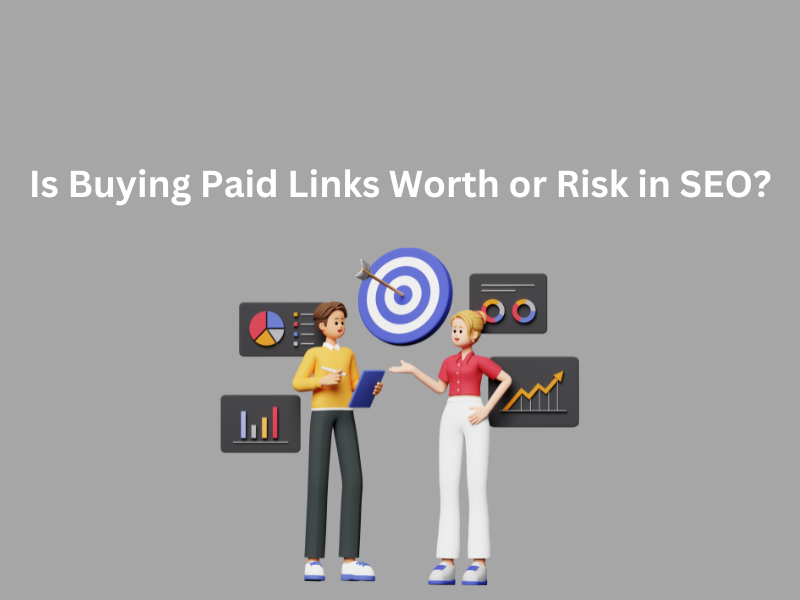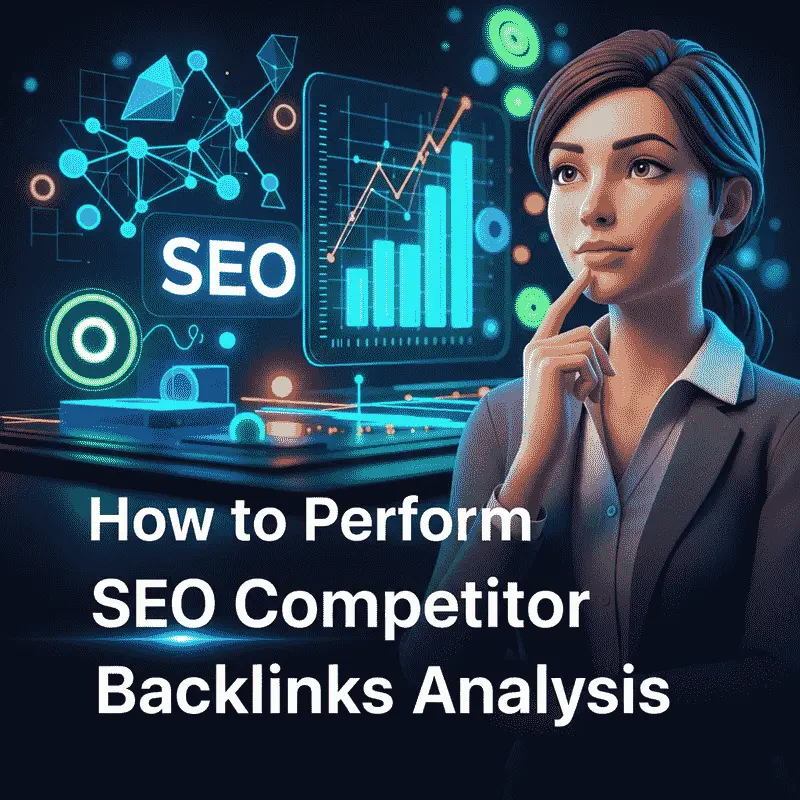In this article, I will briefly discuss paid links, whether they work for SEO, and why SEO experts recommend them. How do they improve your SEO, and what are the risks of incorporating them into your SEO strategy? After reading the article, you will be equipped to decide whether you should use paid links.
Paid backlinks can be a double-edged sword in SEO. It can be incredibly beneficial for your site visibility, as other paid backlinks expose your website’s spammy source in organic search. Paying for links is strictly forbidden by Google and other search engines and can result in harsh penalties.
What are paid links?
A paid backlink is a hyperlink to your site that you purchase with money. The links aim to improve the site’s ranking in search results pages.
These links can come in different forms, including the advertisement, sponsored, and paid product placements. Website owners are intrigued by paying for backlinks as a shortcut for climbing higher search engine rankings. Buying backlinks is the most common activity of black hat SEO.
What are paid links in SEO?
Paid backlinks are links purchased from another site to improve the search ranking of a particular website. These links are generally considered unsafe because they can manipulate search engines. It is also called link farms. Paid backlinks from other sites are recognized ranking factors, but not all links are helpful.
Does Google Penalize Paid Links?
Paid backlinks against Google’s guidelines to sell and buy links to boost your website ranking. If Google or other search engines find that you use paid backlinks to manipulate the algorithm, your website is removed from the index. People are trying to manipulate links and profit from selling them; if detected, Google may have penalties that ruin your SEO.
Should You be Buying Paid Links for SEO (Experts Opinions)
SEO experts share their strategies on how to use paid links. Here are the strategies for analyzing the potential of paid backlinks, minimizing risks and pitfalls to avoid.
Dos and Don’ts
Dos
Timing: According to experts, starting link-building for the new website is not a good strategy. Even if you think of buying backlinks, you need quality backlinks that build up naturally over time. You clearly understand relevant niches and competitors from an SEO perspective.
Pace: You do not buy links quickly. It would be best if you did an in-depth analysis before paying. For a new website, usually start with up to five links in the first month and gradually increase the number over the next month.
Quality: It is essential to analyze quality backlinks carefully before purchasing. You should check and evaluate the domain level and page if you want to get a link from a page that is not live. It is the possibility of a sponsored post on a blog. You can find a search for the site domain.com with the URL in Google for domain analysis.
Looking at site PR, first, assess link juice and low Page rank. It would help if you avoided it altogether, and the easiest way to check is by using SEO SpyGlass. Also, check the domain history and domain age.
Quantity: Do not use only paid backlinks; the ratio of paid backlinks SEO experts consider 10% to 25%. Most of your backlinks are built through relationships that maintain a healthy-looking link profile and are considered safe.
Relevance: Relevance ensures you get links related to your niche. This applies to an entire site, not just the backlink page.
Anchor text: If they want to use your target keyword in the anchor text, they keep it a minimum of 10%. SEO experts say anchor text across paid links should be as diverse as possible. Use brandable anchor text, the most common type to use.
Management: It is important to acquire them and check them every month. Such checks involve the backlinks page quality and authority metrics like the page is still live, the link has not switched to nofollow, anchor text has not been changed, etc.
Don’t
User-generated backlinks: The most common do not buy user-generated links. These include forum posts, bookmarks, and blog comments from communities like Reddit.
Sitewide links: Never buy links from the footer, sidebar, and other site navigation areas.
Backlink package: Backlinks from the package will get the surest Google penalty. Purchase from Fiverr is the most reckless and dangerous.
Backlink selling services: SEO mentions penalties for those who will buy packages from backlinks selling services. Please avoid the service, or Google will penalize such networks and their clients sooner or later.
Dropped domain: Buying backlinks from dropped domains is commonly turned into link farms, even if they look decent.
Ad-heavy, thin content sites: Stay from websites created purely to generate revenue from affiliate links and ads. These are likely to be penalized at some point.
No index sites in search engine: Never buy links from domains penalized by Google and quick check site: domain.com before purchase.
What are Google’s Guidelines on Paid Links?
Paid backlinks against Google’s sell or buy guidelines to boost search ranking. These activities are viewed as link schemes. If search engines like Google detect penalties that ruin your SEO.
How Google Detects Paid Backlinks Schemes?
Google does not detect all paid links. It detects unnatural links; the owner can trigger a red flag if you do a single wrong site. Most websites engage in link schemes but eventually incur penalties. If they do not go the right way, then a future algorithm may sweep them under.
About Advertorials
Paid backlinks are not illegal. Google requires websites that charge for backlink placement and guest posts to add a sponsored and nofollow tag to those links. Links with nofollow tags do not pass on PageRank value, so the site offering them would not be seen as selling links to manipulate rankings.
Link exchange: Google also penalizes excessive backlink exchanges. Only link exchanges if they are useful for readers, websites, or business gain.
Money Anchors: The use of anchor text can also give link schemes. Excessive anchors in backlinks will raise red flags. It is used repeatedly for links to create an unnatural pattern that Google easily detects and penalizes your site.
How to Use Paid Links in SEO?
There are different ways to use paid backlinks in SEO strategies. You can buy high-quality links from relevant sites and make them natural. But Google is still in violation of its guidelines.
Many SEOs use link Detox off-label, which analyzes which links are flagged with high link Detro risk, and then avoid link building those inks in the first place.
Other SEOs are updated with their backlinks audits, and disavowing bad links is flagged as high risk. Paid backlinks are often disavowed after a certain period, proactivity to avoid a Google penalty.
The Risks of Paid Links in SEO
Paid backlinks can be incredibly effective in boosting your search ranking, but they should be weighed against benefits. Your backlink profile will be filled with trusted sites that increase authority and trust overall. These links are more visible than natural links and use criteria like money anchor text.
Link Detox specializes in trying to detect such manipulative backlinks as Google tries. Paid backlinks are not without risk, so it is important to understand the buying process. Purchasing links publicly can harm and put your ranking in danger quickly.
Conclusion
Paid links are also risky for your website and business. There is always a balance between reward and risk. The industry will likely still depend on paid backlinks if you maintain a high margin. You need to be more careful with paid backlinks and stick out like a red flag if you all get links from well-known link sellers.
FAQs:
Are paid backlinks safe?
Paid backlinks can effectively boost your search ranking, but they must be more secure. Google has strict guidelines against link schemes, which include selling or buying links to manipulate rankings. If detected, Google can penalize your website, negatively affecting your SEO.
However, if the paid links are purchased from relevant and trusted sites and made to appear natural, they can be useful in improving your backlink profile. It is important to weigh the benefits against the risks and to be cautious when purchasing paid backlinks.
Are paid backlinks worth for SEO?
Paid backlinks can be worth it for SEO if purchased from relevant and trusted sites and made to appear natural. Such links can help improve your backlink profile by increasing your website’s authority and trust.
However, it is important to weigh the benefits against the risks and to be cautious when purchasing paid backlinks. Google has strict guidelines against link schemes, which include selling or buying links to manipulate rankings. If detected, Google can penalize your website, negatively affecting your SEO.
Therefore, it is recommended to use paid backlinks as a part of a comprehensive SEO strategy, along with other tactics such as creating quality content and building relationships with other sites in your niche.
Does Google penalize paid links?
Yes, Google penalizes paid links that violate its guidelines on link schemes. Buying or selling backlinks to manipulate search rankings violates Google’s guidelines & can lead to penalties. Google uses complex algorithms to detect and penalize websites that engage in such practices.
If detected, the penalties can range from a drop in search rankings to completely removing the website from Google’s search results. It is important to note that paid links are not illegal, but they need to be used in compliance with Google’s guidelines. Websites that charge for backlink placement and guest posts must add a sponsored and nofollow tag to those links, which indicates that the links were paid for and should not pass on PageRank value.
Does paid search affect SEO?
Paid search does not directly affect SEO; they are two separate marketing channels. Paid search, or pay-per-click (PPC) ads, involves paying for ads to appear at the top of SERPs. On the other hand, SEO focuses on increasing the organic ranking of a site in search engine results pages through tactics such as creating quality content, building backlinks, and optimizing website structure.
However, paid search can indirectly impact SEO by providing insights into which keywords generate traffic and conversions. This information can inform SEO strategy, such as targeting specific keywords in content creation and optimizing website structure for those keywords. Additionally, paid search can drive more website traffic, increasing the likelihood of gaining backlinks and improving organic search rankings.
A comprehensive digital marketing strategy should include paid search and SEO tactics to maximize online visibility and achieve business goals.
What are paid links in SEO?
Paid links in SEO refer to links purchased from other websites in exchange for money or other compensation. Buying paid links aims to improve a website’s SE ranking by increasing the number of backlinks pointing to the website.
However, paid links violate Google’s guidelines on link schemes, which include buying or selling links to manipulate search rankings. If detected, Google can penalize a website, negatively affecting its SEO.
Paid links are not illegal but need to be used in compliance with Google’s guidelines. Websites that charge for backlink placement and guest posts must add a sponsored and nofollow tag to those links, which indicates that the links were paid for and should not pass on PageRank value.
A safer alternative to paid links is to focus on building high-quality backlinks organically by creating quality content that other websites want to link to, building relationships with other sites in the same niche, and utilizing social media to promote content and build brand awareness.
Are sponsored links on Google safe?
Yes, sponsored links on Google are safe as long as they comply with Google’s guidelines on advertising. Google allows sponsored links, also known as Google Ads or pay-per-click (PPC) advertising, to appear at the top of Google search results pages alongside organic search results.
To ensure the safety and relevance of sponsored links, Google has strict policies that advertisers must follow, such as transparently disclosing the nature of the ad, not promoting counterfeit goods or dangerous products, and not using deceptive or misleading practices to generate clicks.
Google also uses sophisticated technology to detect and prevent fraudulent or malicious advertising practices and to ensure that advertisements are relevant and useful to users.
Overall, sponsored links on Google are safe and can be an effective way for their businesses to reach target audience and drive traffic to their website.



